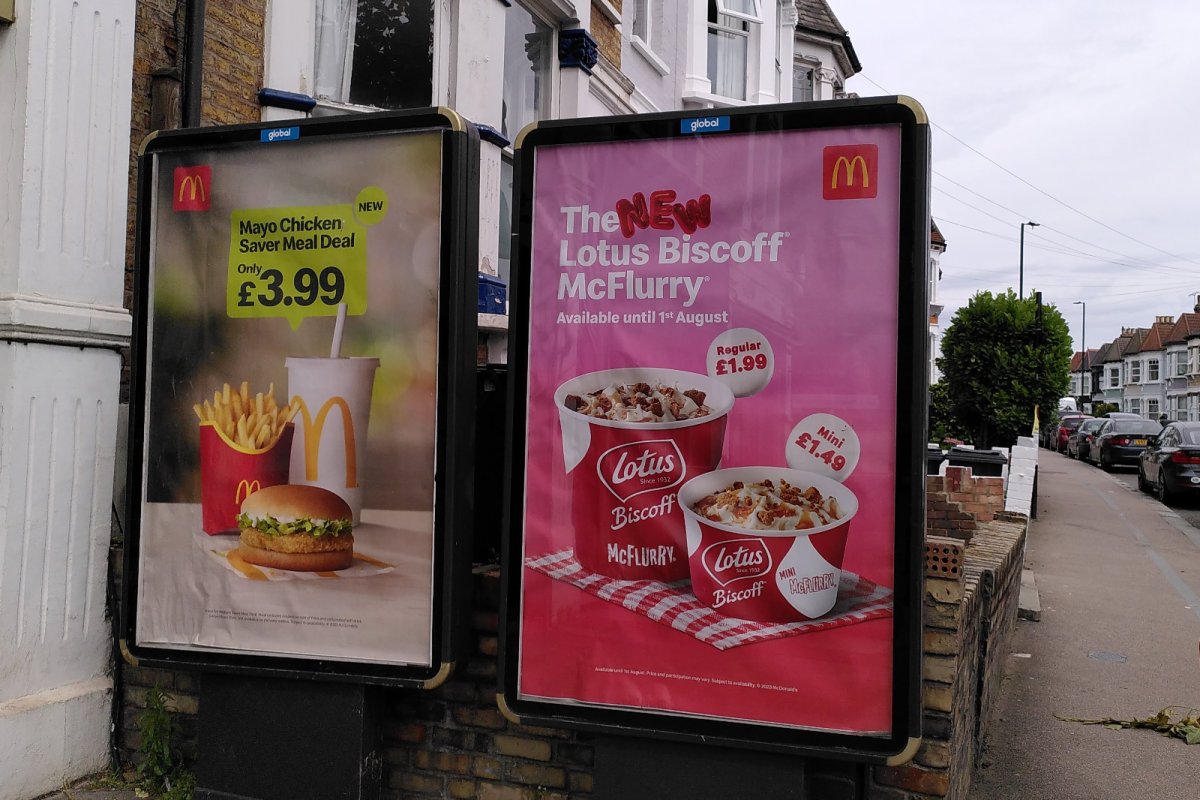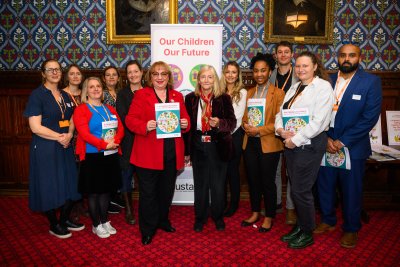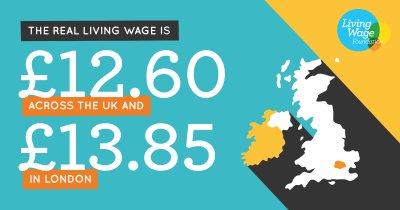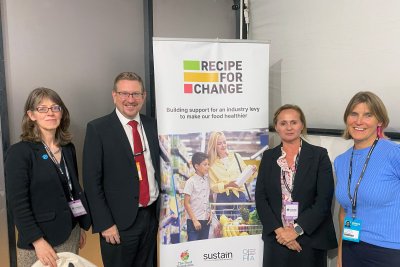 Mcdonalds advertising unhealthy food on a residential street. Credit: Fran Bernhardt
Mcdonalds advertising unhealthy food on a residential street. Credit: Fran Bernhardt
The fight is on to stem the flood of unhealthy food: but is it enough?
A year has passed since restrictions on placements of unhealthy foods and drinks in supermarkets have come into place, whilst more UK councils are adopting policies that restrict unhealthy food advertising. These are great steps, but we still have a long way to go, explains Fran Bernhardt.
It’s hard to be healthy if you’re being flooded with unhealthy foods and drinks, as so many of us are across the UK. From the sugary drinks on our bus stops, to the misleading promotions on yoghurts and cereals, to the hot food takeaways saturating our high streets. It’s constant, it’s strategic and it’s worsening our health. Diet related diseases like diabetes, tooth decay and cancer are all showing marked rises. And the Government is so far off their target to halve child obesity that if we weren’t talking about a condition which severely restricts young people’s opportunities, it would be laughable. But sadly, this is no laughing matter. It’s shameful that our Government has shied away from their responsibilities. Especially when we know that children from more socially and economically disadvantaged homes are at a much higher risk. This is yet another gratuitous inequality they must overcome.
But there’s some exciting changes afoot, some of them thanks to years of hard work at Sustain. Here’s a few things you should know about:
Local advertising policies now established in 8 UK boroughs + London’s Transport network
The thing is, if advertising didn’t work, companies wouldn’t spend so much money on it. So when we see adverts for unhealthy food, it results in us buying lots more of the stuff that’s advertised. In fact, for every additional unhealthy food advert young people see, it results in them eating an extra 350 calories of unhealthy food per week!1 Since the UK Government has embarrassingly shied away from their own policy commitments to restrict unhealthy food advertising on TV and online, we’ve seen a wave of momentum from local leaders across the country who are doubling down on their efforts to champion people’s health. With the policy bringing benefits to public health, equalities and climate all at negligible financial cost, this is a no-brainer of an intervention. And as many council leaders have now said to me, they are concluding, it’s “the right thing to do”. I’m supporting over 100 councils to bring these policies in, and most recently, we had success in the Luton Council. They are now the eighth local authority to bring the policy in. Slowly but surely, brave local leaders are setting the stage for healthier food so that we champion our health over corporate profits.
One year of stopping big shops from putting unhealthy foods in prominent locations
Like when you’re just entering the store & there’s walls of chocolates. When you’re lining up to pay & there’s tons of child-pestering-inducing cartoon covered sweets. Or when you’re on your way to grab a milk carton & you pass by the shrine to crisps at the end of an aisle. That’s no accident: those products didn’t fall into prominent locations. And it’s not just you who slips unhealthy food that you never planned to buy into your trolley. It’s all strategic. The government’s policy set out to remove that temptation. So you can still buy those things from their aisle if you want to, you just won’t be swimming in them from the moment you set foot in the store. It’s now been a year of these restrictions and while we’re seeing important switches away from unhealthy food, there’s lots more work needed. This is one of the only policies from the 2020 Obesity Strategy that the Government didn’t take an axe to, and it’s clear is that it is not sufficient to address the flood of unhealthy food on its own.
The national child measurement programme
One of the ways we know how things are going is by checking out data on the UK’s young people in reception and year 6. This year’s stats have just been released, and while they show a slight decrease in young people living with overweight and obesity, it’s nowhere near the much-needed reductions. In fact, the biggest drop was in the numbers of children in reception living with obesity, which fell 0.9%. But at 9.2%, that still means almost 1 in 10 five-year-olds is living with obesity. What the data also clearly demonstrates is that overweight and obesity is strongly correlated with deprivation. Children from the most economically disadvantaged homes are more than twice as likely to be living with obesity than those who are better off (30.2% vs 13.1%). And that graph is very telling. With every step towards worsening deprivation increasing the risk of obesity.
It’s now been 5 years since the then secretary of state for Health, Jeremy Hunt promised us that the Government would halve child obesity by 2030. And it will probably come as no surprise to hear we’re not on track. In fact, we’re way off track. We’re pretty much where we were when Mr Hunt made that statement. And in some cases, we have even higher rates now than we did after 5 years of supposed action. For example, the numbers of year 6 children living with obesity is now 22.7% which exceeds the 2018 levels of 20.2%. We’ve got 7 years to go, and it doesn’t take a data genius to work out that if we’ve been taking insufficient action for the first 5 years, we have less time to meet our targets now and we’re going to have to take even more drastic action. This really underlines the importance of the commitments the Government has repeatedly delayed and failed on delivering. At this point, we need to see these introduced as soon as possible so that we really can build those much-needed flood defences and champion everyone’s health.
References:
1 Cancer Research UK (2018)
2 Kantar (2023)
3 NHS (2023)
4 Department of Health (2018)
5 NHS (2019)
Commercial Determinants: We believe our health and the health of our planet must be prioritised ahead of companies’ profits. We’re taking a stand with policymakers by bringing in regulations that incentivise industry to higher standards.
Sustain
The Green House
244-254 Cambridge Heath Road
London E2 9DA
020 3559 6777
sustain@sustainweb.org
Sustain advocates food and agriculture policies and practices that enhance the health and welfare of people and animals, improve the working and living environment, promote equity and enrich society and culture.
© Sustain 2024
Registered charity (no. 1018643)
Data privacy & cookies
Icons by Icons8








